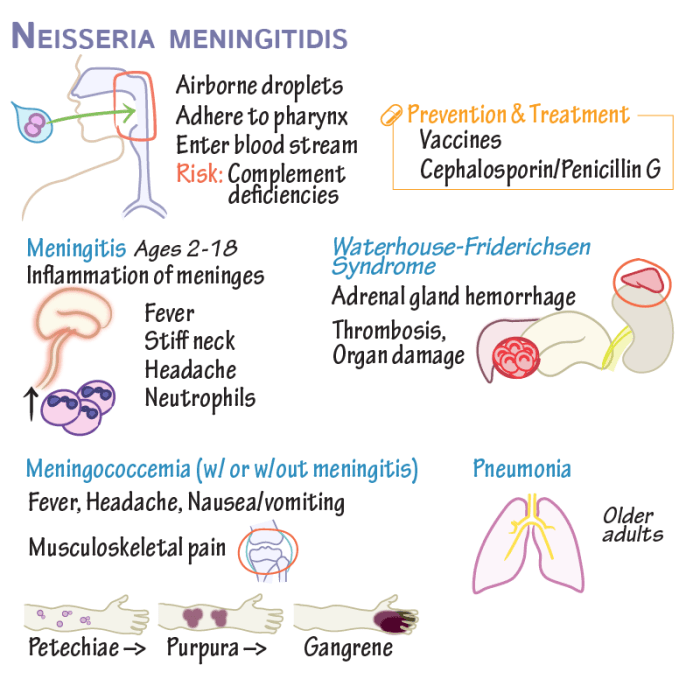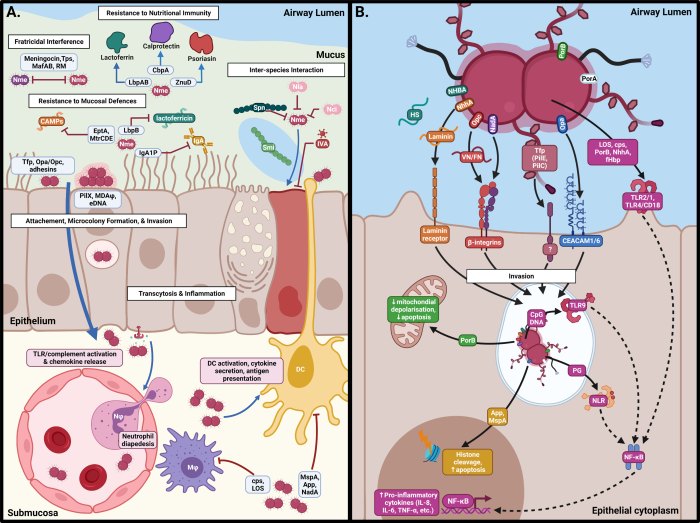Which of the following statements about neisseria meningitis is false – In the realm of infectious diseases, Neisseria meningitidis stands as a formidable foe, capable of causing devastating infections. This discourse delves into the intricate tapestry of Neisseria meningitis, separating truth from falsehood to shed light on the intricacies of this enigmatic bacterium.
As we embark on this exploration, we shall critically examine a series of statements about Neisseria meningitis, discerning the veracity of each assertion. Through rigorous scientific inquiry and evidence-based reasoning, we aim to dispel misconceptions and illuminate the true nature of this enigmatic pathogen.
1. Introduction

Neisseria meningitidis, commonly known as meningococcus, is a Gram-negative bacterium that causes a range of infections, including meningitis, a life-threatening inflammation of the brain and spinal cord membranes. The bacterium is a significant public health concern, particularly in areas with limited access to healthcare and vaccination programs.
2. False Statements
Statement: Neisseria meningitidis is only transmitted through direct contact with an infected person.
This statement is incorrect. While direct contact with an infected person can transmit Neisseria meningitidis, it is primarily spread through respiratory droplets from coughing or sneezing.
3. True Statements, Which of the following statements about neisseria meningitis is false
- Neisseria meningitidis is a highly contagious bacterium.
- The bacteria colonize the nasopharynx of approximately 10-25% of healthy individuals without causing symptoms (carriage).
- Meningococcal meningitis is a severe infection with a high mortality rate if not treated promptly.
4. Prevention and Control
Vaccination is the most effective way to prevent Neisseria meningitidis infections. Several vaccines are available, including conjugate vaccines and polysaccharide vaccines. These vaccines provide protection against different serogroups of the bacteria.
Other measures that can help reduce the risk of infection include:
- Practicing good hygiene, such as frequent handwashing and covering coughs and sneezes.
- Avoiding close contact with people who are sick.
- Taking antibiotics as prescribed by a healthcare professional if exposed to the bacteria.
5. Clinical Manifestations
| Symptoms | Severity | Potential Complications |
|---|---|---|
| Fever | High | Brain damage, seizures |
| Headache | Severe | Nausea, vomiting |
| Stiff neck | Moderate | Meningitis, encephalitis |
| Confusion | Severe | Sepsis, shock |
| Nausea and vomiting | Moderate | Dehydration, electrolyte imbalance |
| Rash | Variable | Skin necrosis, purpura fulminans |
6. Laboratory Diagnosis
Diagnosis of Neisseria meningitidis infections involves laboratory tests and imaging techniques.
- Laboratory tests:Blood cultures, cerebrospinal fluid cultures, and polymerase chain reaction (PCR) tests can detect the bacteria.
- Imaging techniques:Computed tomography (CT) scans and magnetic resonance imaging (MRI) scans can help visualize the brain and spinal cord for signs of inflammation.
Early and accurate diagnosis is crucial for effective treatment and improving patient outcomes.
7. Treatment
Treatment for Neisseria meningitidis infections typically involves antibiotics. The choice of antibiotics depends on the serogroup of the bacteria and the severity of the infection.
- Penicillin:The antibiotic of choice for most cases of meningococcal meningitis.
- Ceftriaxone:An alternative antibiotic that may be used if penicillin is not tolerated.
- Vancomycin:An antibiotic that may be used in cases of penicillin resistance.
Timely and appropriate treatment is essential to improve patient outcomes and reduce the risk of complications.
FAQ Compilation: Which Of The Following Statements About Neisseria Meningitis Is False
Is Neisseria meningitidis a highly contagious bacterium?
While Neisseria meningitidis can spread through close contact, its transmission is not as efficient as other highly contagious respiratory pathogens like influenza.
Can Neisseria meningitidis infections be treated with antibiotics?
Yes, antibiotics are the primary treatment for Neisseria meningitidis infections. Early and appropriate antibiotic therapy is crucial for improving patient outcomes.
Is vaccination an effective way to prevent Neisseria meningitidis infections?
Yes, vaccination is a highly effective way to prevent Neisseria meningitidis infections. Several vaccines are available, providing protection against different strains of the bacterium.


